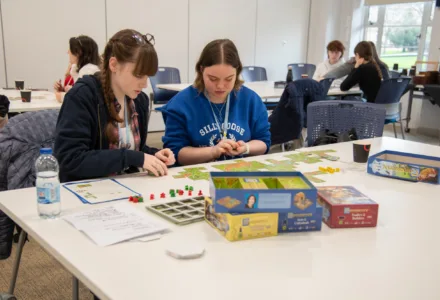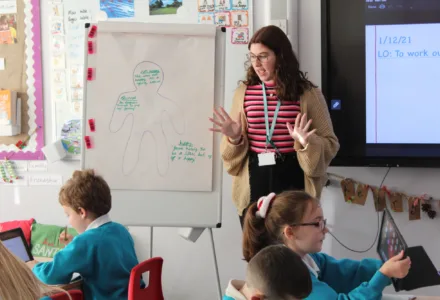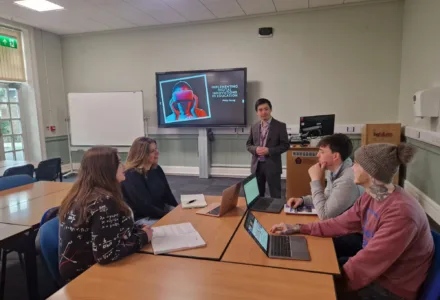Why study this course
Pre-service bursaries available in selected subjects for up to £26,000
Trainees who complete the course will be eligible to apply for QTLS (Qualified Teacher Learning and Skills) with the Society for Education and Training. This is equivalent to QTS and is suitable for those who may consider teaching post-14 learners in the schools sector*
You can specialise in your chosen subject and gain over 150 hours of experience in a post-16 placement setting
The programme has two routes, so is open to both graduates (PGDE route) and non-graduates who have extensive industry experience and are looking to teach in their vocational specialist field (CertEd route)
Course summary
The Professional Graduate Diploma in Education (Teaching Post-16 and Further Education) offers education, training and development to graduates who are practising or aspiring teachers who wish to teach courses such as BTECs/ CTECs, A Levels and Access to HE in further education colleges, Sixth form colleges, private sector training providers, and offender education. It provides a route into teaching in the training and skills sector for graduates, and leads to a robust teaching qualification, which is recognised in the sector. The programme develops participants’ knowledge and understanding of the theory and practice of teaching, learning and assessment, and teachers’ wider, professional engagement in the sector.
The programme offers a challenging, supportive and rewarding experience to promote informed, reflective and effective teaching and professional development.
This pGDE offers three specialist routes, for students wishing to specialise either in Vocational, Academic or SEND delivery in the sector.
Please Note: Non-graduates (such as TAs, those with industry experience and specialist qualification) may study this programme at level 5.
This course leads to Qualified Teaching Learning and Skills (QTLS) status*.
*For those meeting the eligibility criteria QTLS eligibility | Society for Education and Training
Key facts
|
Award |
PGDE |
|---|---|
|
Duration |
1 year (FT), 2 years (PT) |
|
Mode of study |
Full time, Part time |
|
Start date |
September 2025 |
|
Award |
Bishop Grosseteste University |
|
Institution code |
B38 |
Apply for this course
When you're ready to apply, the route you take will depend on your personal circumstances and preferred method of study. Click the relevant button below to start your application journey.
About this course
Our Professional Graduate Diploma in Education (Teaching Post-16 and Further Education) is part of an integrated programme for teachers in the education, training and skills sector such as further education colleges, private sector training providers and offender education. It will develop your knowledge and understanding of the theory and practice of teaching, learning and assessment, and teachers’ wider, professional engagement in the sector. It offers a challenging, supportive and rewarding experience to promote informed, reflective and effective teaching and professional development.
The course features three specialist routes of Academic (for those wishing to teach A Levels), Vocational and Special Education Needs and Disabilities (SEND). It combines teaching practice, academic learning, and personal, professional development. Teaching practice will be undertaken within an arranged placement in order to develop the teaching of your specialist subject. You may be required to travel to this placement using an appropriate mode of transport, which may incur an additional cost. You will be allocated a work-based mentor, who will typically be a professional practitioner with expertise in your subject or a closely allied area.
Throughout the programme, modules are delivered concurrently to your teaching practice, allowing you to make robust connections between theory and practice and develop the habit of reflective evaluation. All modules re-enforce the concept of reflective practice as essential to effective teaching and learning, as well as the personal and professional development within your chosen specialist subject.
Changes to course content
We use the best and most current research and professional practice alongside feedback from our students to make sure module content is relevant to your future career or further studies.
Therefore, module content will change over time to reflect changes in the discipline or industry.
Scheduled Teaching Hours
Postgraduate programmes consist of 180 HE credits, with each credit equating to 10 hours of learning.
Depending upon the mode of delivery (i.e. face-to-face/in-person, online or a blend of these) and whether your course is full-time or part-time, the delivery of the scheduled hours for the programme will involve taught input, independent study, and where applicable, work-based or placement hours.
What you will study
Students on this course currently study some or all of the following modules:
This module will equip you with initial and essential skills to enable you to prepare and ready yourself for initial teaching practice in your subject. During this module you will be introduced to the theories and principles of teaching, learning and assessment relevant to Vocational, Academic and SEND teaching. You will be encouraged to make connections between theory and practice. This module is the initial introduction to teaching practice, which is designed to prepare you to promote inclusive attitudes and values in their learning environments and within the content that you prepare and teach. This module looks at the skills needed to enable the trainee teacher, tutor or trainer to be a successful teacher in the Education and Training. The module content is designed to introduce you to the skills and knowledge required for everyday teaching and learning in your subject area will include:
• The roles, responsibilities and boundaries of the teacher
• The context of the education sectors
• Legislation, regulations and policy and procedure
• Inclusive teaching and learning strategies
• Equality of opportunity
• Effective planning to mitigate factors influencing learning
This module looks at ‘Who my learners are’ and is intended to explore the breadth of FE learners and their journeys into FE. It is predicated on the idea that teachers who are aware of where learners are coming from, are more able to adapt teaching to their needs. Additionally FE is a very broad sector this modules endeavours to alert trainees to the scope of the potential role in FE. This module is designed to develop your skills in your own professional context to be able to design, plan and assess learning. This will be based on the principles and theories of assessment, including:
• Principles of assessment
• Enabling learning through assessment
• Planning to meet the needs of learners
• Understanding inclusive learning and teaching and barriers to achievement
This module will build on ‘Learners and Learning’. The progressive rationale is that consideration of “who my learners are”, feeds into how they learn, and similarly, discussion runs into “how do I choose to teach”?
This unit will develop your sense of the responsibility for making decisions as to what takes place in the classroom/workshop. You will have opportunities to look at the psychological theories surrounding learning so that you have an appreciation of the parameters of human learning. You will be expected to have a familiarity with established theory (Piaget, Vygotsky, Skinner/Watson, Guilford, etc), and the relevant critiques. Likewise, in terms of teaching, you are expected to explore contemporary pedagogy and to engage with current work in the area: Thomas, O’Leary, Hattie, etc.
You should have a grasp of the strengths and weaknesses of these approaches, recognising that none is a formula and all approaches have nuances.
This module will look at your own personal digital skills, the range of Ed Tech available to teachers and how to manage managing digital delivery (i.e how tutors can create both synchronous and asynchronous learning materials). It will introduce you to the key approaches and theories relating to online teaching and learning.
You will critically engage with the principles of online pedagogy in both theory and in practice, studying the recent work and learning theory of academics such as Diana Laurillard and Richard Mayer, before examining how these frameworks can be applied in practice.
This holistic approach ensures that, by the end of the module, you will have developed the appropriate level of competence in Digital Skills and Educational Technology for your own practice.
This module positions the teacher in education and training as an agent of change, building resilience and self-efficacy in learners. The module emphasises the holistic nature of learner needs, to enable you to promote learners’ personal attributes of confidence, autonomy and long-term employability. The concepts of inclusivity and differentiated approaches to teaching and learning are fundamental to becoming a responsive teacher, and depend upon a foundational understanding of how people learn.
This module builds upon the previous modules by further developing your understanding of established and emerging theories and models of teaching and learning. You will draw upon this knowledge to evaluate the affordances to effective learning and the impact of potential barriers, both internal and external.
The module considers ways in which to challenge and mitigate barriers to learning in the context of day-to-day practice, including behaviour management and safeguarding. This module reinforces the application of theoretical knowledge to effective, responsive teaching, learning and assessment.
The content of this module focuses on supporting you to develop and demonstrate the required skills to teach effectively in the Further Education and Skills (FES) Sector. You will be given a range of tasks and opportunities that will contribute to the development of the required portfolio as outlined by the Education and Training Foundation. Specific content of the module and approaches will reflect the emerging needs of the cohort and the sector. You will reflect upon and track the progress of their professional practice and digital literacy skills regularly, drawing upon planned experiences, feedback, theory, and current research taught in Modules 1-5 to inform practice
Through regular reflection, you will develop focused actions and creative solutions to develop your professional practice and enhance the learner experience. Throughout the professional Professional Practice module, you will develop the skills and knowledge required to make judgements as to the suitability of learning, teaching, and assessment strategies, and learn how to identify and respond to the needs of learners. You will develop the knowledge required to take appropriate action to guard the safety and well-being of learners, the skills required to promote a positive view of inclusion, and confidence in promoting positive student behaviour and attitudes. You will engage in a variety of experiences to broaden your understanding of the sector and wider roles of a teacher, and have the opportunity to experience and practise a variety of delivery methods, including face-to-face, blended, synchronous online, asynchronous online, and hybrid delivery.
Learning from the experiences and specific events or scenarios you encounter will be captured in a Professional Practice Portfolio and through the completion of a series of themed reflections. You will be supported to reflect upon general pedagogy and approaches to teaching of your subject specialism in regular meetings with a Subject Mentor and Personal Tutor. The summative assessment tasks reflect the national requirements of the profession, these need to be passed alongside meeting the placement requirements as indicated by the Education and Training Foundation in order to gain the teaching qualification.
Entry requirements
- A bachelor’s degree
- Typically, minimum Level 3 in the subject the trainee intends to teach
- Level 2 qualification in Mathematics and English*
- Access to a minimum of 150 hours of teaching over the period of the programme, this is sourced by BGU in most instances, with suitable Disclosure Barring Service (DBS) documentation and an identified mentor (for the part-time route, the 150 hours of teaching should be no fewer than 75 hours in any one year)
For a Level 5 qualification please see our Certificate in Education Training and Skills.
Please note that the part-time route is only available for those currently in employment the sector/ those in roles in education such as teaching assistant who are looking to progress or currently work in their specialist field and are looking to become a duel professional.
How you will be taught
All modules contain elements of theory and practice, and require you to take responsibility for your progress by maintaining a personal development portfolio and teaching practice portfolio, tracking your progression. A named personal tutor, cohort learning sets and online learning materials are available to support you as you progress.
Your learning experience will be made up of directed learning, which typically involves scheduled learning and tutorials with the programme teaching team, as well as a placement of approximately 90 days . This will enable you to undertake the required minimum 150 hours of teaching time and to engage with a variety of activities in order to develop the teaching of your specialist subject. As part of this you will be expected to undertake independent study which may include reading, research, portfolio building, group projects, action planning, developmental activities, events and maintaining industry connections.

Assessment
This course aims to give you the tools needed to be an effective practitioner within the sector. Each module carries one or two assessment components, these include things such as tasks, essay, case study, reflective reports, individual and presentations, action planning and evaluation of day-to-day teaching practice.
Teaching practice is integral to successful completion of the programme. You will undergo a minimum of ten teaching observations, working with tutors and mentors to identify suitable opportunities for observation, dialogic review and feedback. The planning, evaluation and feedback for each of the observations will be compiled within your teaching portfolio.
You will also maintain a professional development portfolio, which promotes personal, professional development. The components of this portfolio are aligned to module assessments and the Learning and Skills Teacher Occupational Standards and include, for example, reflective accounts, peer observations and a structured, personal development plan.
At the end of the programme students will need to participate in a final assessment involving a oral discussion relating to any aspect of professional practice.
Careers & Further study
This course will ensure that you are prepared to teach in the Further Education and Skills sector. It has been written in direct consultation with further education colleges, considering their perspectives as employers. On successful completion of this programme, you will be eligible to apply for the professional status of Qualified Teacher Learning and Skills (QTLS) via the Society for Education and Training (SET).
Since April 2012, FE-trained teachers with QTLS have been recognised through an Act of Parliament as equivalent in status to teachers with Qualified Teacher Status (QTS) in schools, opening up opportunities for career development and wider employment. This course offers a robust professional development route to QTLS and further development of careers. Progression from this programme has many routes, whether that is onto further study at Master's’ level or into employment.
What Our Students Say
Discover what life is like at Bishop Grosseteste University from our students.
Support
Studying at BGU is a student-centred experience. Staff and students work together in a friendly and supportive atmosphere as part of an intimate campus community. You will know every member of staff personally and feel confident approaching them for help and advice, and staff members will recognise you, not just by sight, but as an individual with unique talents and interests.

We will be there to support you, personally and academically, from induction to graduation.
At BGU we have so much support available for our students, the type of support that has won us awards recently in the What Uni Student Choice Awards 2023, such as the Chaplaincy team, the Student Advice team, The Hub and representatives at the Students’ Union.
Fees & Funding
A lot of student finance information is available from numerous sources, but it is sometimes confusing and contradictory. That’s why at BGU we try to give you all the information and support we can to help you throughout the process. Our Student Advice team are experts in helping you sort out the funding arrangements for your studies, offering a range of services to guide you through all aspects of student finance step by step.
Click here to find information about fees, loans and support which will help to make the whole process a little easier to understand. For all applicants, there are full instructions at UCAS to make it as easy as possible for you to fill in your online application, plus help text where appropriate. Full details of all tuition fees can be found here.
For all applicants, there are full instructions here to make it as easy as possible for you to fill in your online application, plus help text where appropriate.
Trainees say that they are known ‘as a name, not a number’ and that they get the right help at the right time to become ‘fully fledged’ by the end of their course.


















































